#a village in the third reich
Explore tagged Tumblr posts
Text
My extremely objectively correct media favorites for 2023:
Books
Fantasy
Black Sun by Rebecca Roanhorse
The Centre by Ayesha Manazir Siddiqi
Ink Blood Sister Scribe by Emma Torsz
The Oleander Sword by Tasha Suri
Piranesi by Susanna Clarke
Other Fiction
The September House by Carissa Orlando (horror, arguably fantasy)
The Winter Guest by W.C. Ryan (mystery/historical drama)
Kala by Colin Walsh (mystery)
The Wild Hunt by Emma Seckel (historical drama, arguably fantasy as well lolll)
August Blue by Deborah Levy (contemporary fiction (for once!))
Nonfiction
No Ordinary Assignment by Jane Ferguson
A Village in the Third Reich by Julia Boyd
The Nineties: A Book by Chuck Klosterman
The Russo-Ukrainian War by Serhii Plokhy
Nazi Culture by George L Mosse
Movies
Polite Society (action/comedy, dir. Nida Manzoor)
Rustin (historical drama, dir. Colman Domingo)
Saltburn (dark comedy, dir. Emerald Fennell)
Flora and Son (comedy/drama, dir. John Carney)
Past Lives (drama, dir. Celine Song)
TV
The Bear
Slow Horses
Succession
Doctor Who (RTDv2)
Beef
#black sun#the centre#ink blood sister scribe#the oleander sword#piranesi#the september house#the winter guest#kala#the wild hunt#August blue#no ordinary war#the Russo-Ukrainian war#the nineties#a village in the third reich#polite society#saltburn#Rustin#flora and son#past lives#the bear#beef#doctor who#slow horses#succession
5 notes
·
View notes
Text
Henriëtte Laman Trip-de Beaufort- A Forgotten Hero
Nearly every time when I do a post about a ‘forgotten hero’ I get comments like” I didn’t forget about her” or “How dare you imply she has been forgotten”. These people unfortunately miss the point of the post, for some reason they feel like it is a personal attack on them. The heroes I write about, are in the greater scheme of things often forgotten. They may be known or remembered by a few, but…

View On WordPress
#1928 Summer Olympics#A Village in the Third Reich#Bavaria#Germany#History#Holocaust#Pre WWII#the Netherlands#World War 2
0 notes
Text
While still looking to figure out whether to do another fan fic if NYPD Bela Dimitrescu and family in modern NYC.
I am resuming my current one of How a Dimitrescu Heart Beats, so expect some exciting adventures and moments ahead. A preview of what to expect…sorry ai generation isn’t the most accurate and not good with photoshop, but I think we know what they are meant to be….
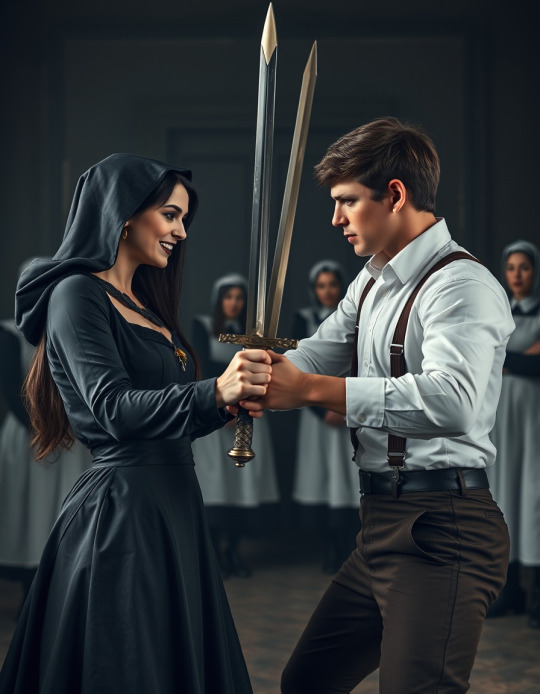
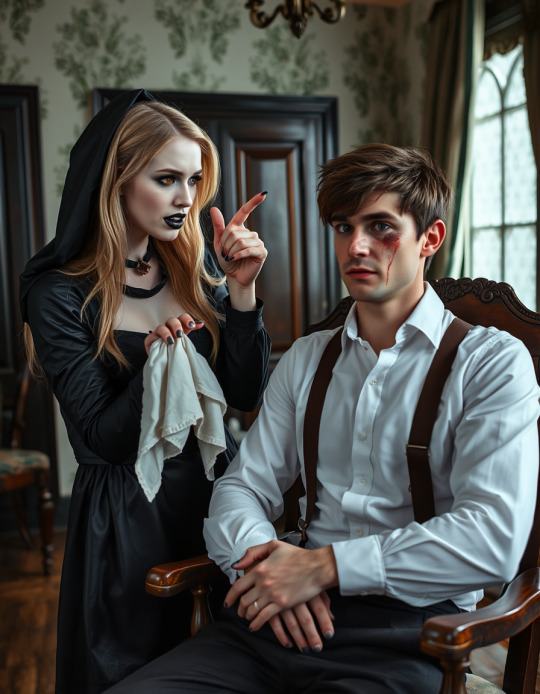
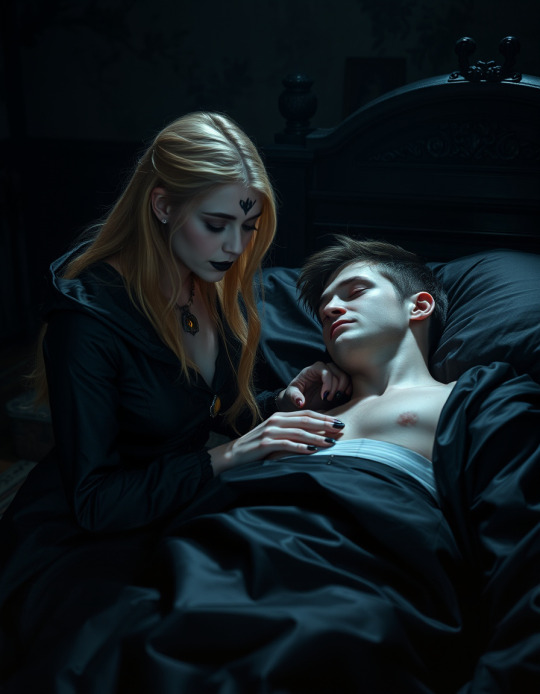
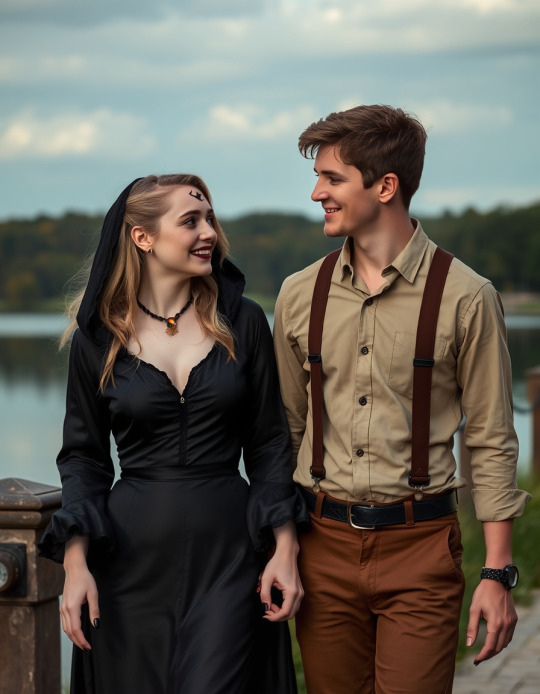
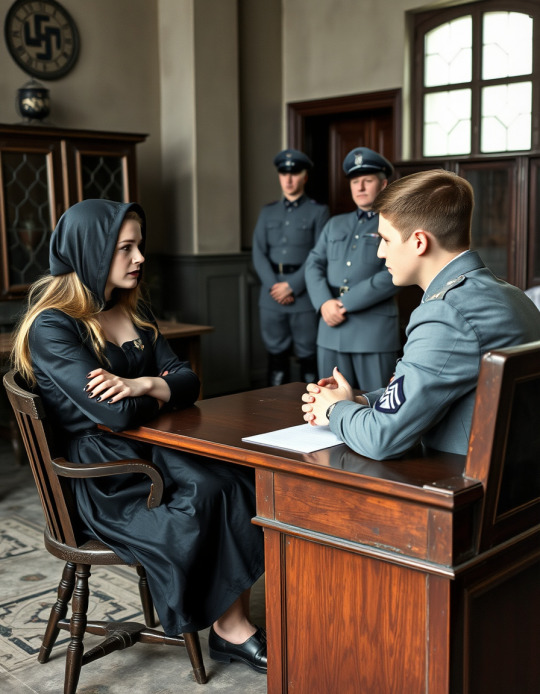
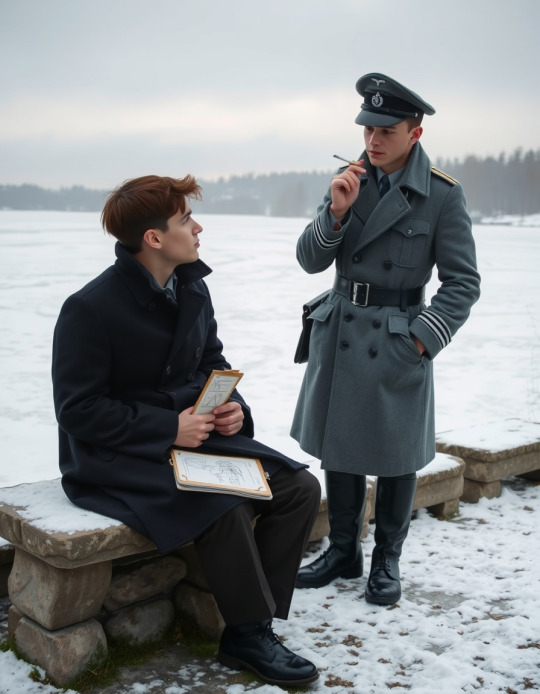
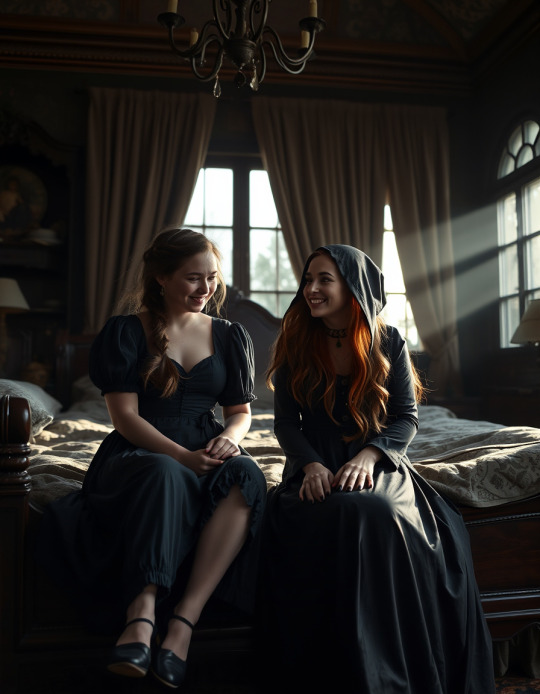
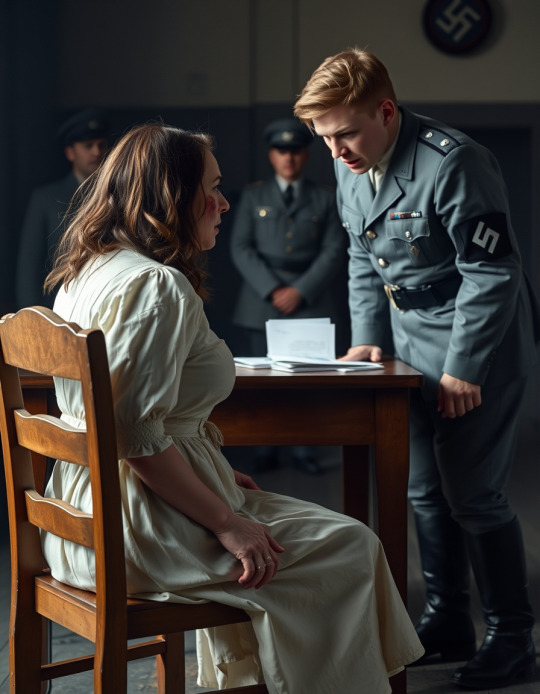
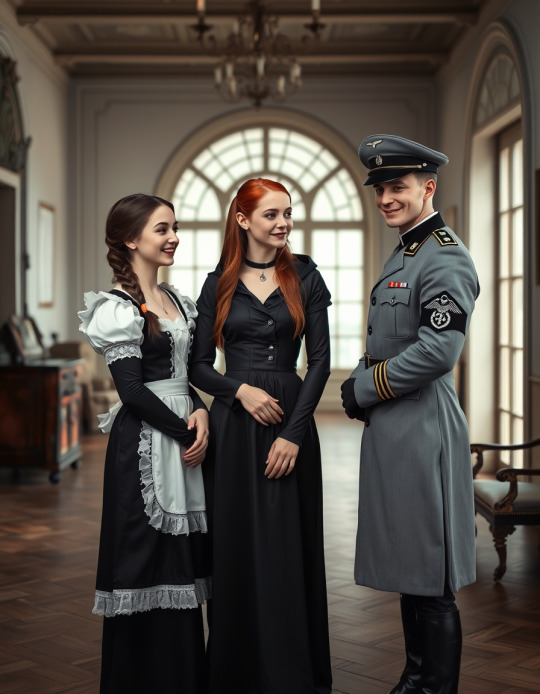

#fanfic#bela dimitrescu#resident evil village#resident evil#cassandra dimitrescu#world war 2#alcina dimitrescu#daniela dimitrescu#original male character#original female character#Third Reich
2 notes
·
View notes
Text
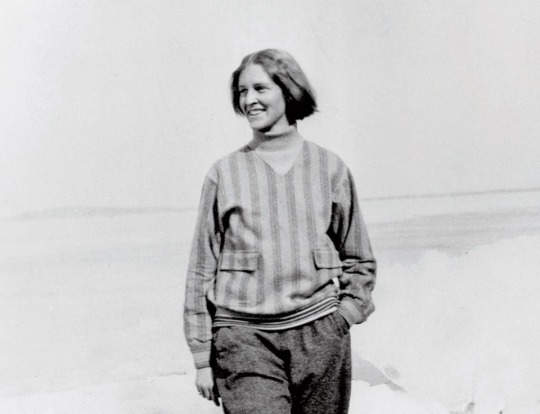
She was a teacher. She just wanted to help.
She was born in Milwaukee on September 16, 1902. She was known as "Mili" to her friends and attended West Division High School, now known as the Milwaukee High School of the Arts.
She would meet her future husband at the University of Wisconsin-Madison, where she earned a Bachelor of Arts in English in 1925, and a Master of Arts in English in 1926. They were married at her brother's farm near the village of Brooklyn, Wisconsin.
"They had a profound connection through literature, her Ph.D. was in literature," Madison arts program administrator Karin Wolf said. "That's what inspired and sustained them, the works of Walt Whitman in particular. I just feel them as very real people. They liked to hike, they liked to canoe, they liked being outdoors."
In 1929, she and her husband moved to Germany, where she worked on her doctorate. She taught modern American literature at Berlin University, becoming one of the first Americans on a faculty that included Albert Einstein.
The position was short lived, however, according to a story in The New York Times. Fifteen months later, the university had fired her for not being “Nazi enough.”
Adolf Hitler had been granted dictatorial powers by a subservient legislature. After the concentration camps opened, the couple had decided to stay in Germany, to assist immigrants fearful for their lives.
"They were confronted with this unacceptable situation, and they did what they felt what they needed to do as moral beings,” said Wolf.
They were saddened at what was happening to their beloved country, to see a dictator use racism to divide the people and use his propaganda machine to reinforce his power and control the people, destroying the country from within.
Alarmed by the rise of Hitler and the Nazi regime, she and her husband joined a small resistance group that helped imperiled Jews, assisted forced laborers, and documented the atrocities of the Nazis in Germany. Her husband would regularly meet with the first secretary of the American embassy to keep Washington informed on the state of the Third Reich’s economy, its trade agreements, rearmament and war plans.
Their group published an underground newsletter, and fed economic information not only to the U.S., but also to Soviet embassies in Berlin. After Germany invaded Russia, the group transmitted military intelligence to Moscow via radio “concerts,” prompting the Gestapo to call them the “Red Orchestra.”
On September 7, 1942, Mildred Fish-Harnack and Arvid Harnack were arrested while on a weekend outing in Germany.
Arvid was sentenced to death on December 19, 1942, and was put to death three days later. Mildred would be executed two months later, beheaded, on the orders of Adolf Hitler.
Mildred Fish-Harnack was the only American woman executed on the orders of Hitler. She was 40 years old.
"She could have come home at any time," Wolf said. "But there was something bigger than her that was compelling her to fight in the way that she could. I just think of that strength of character."
Shereen Blair Brysac, Harnack's biographer, said in a 2011 Wisconsin Public Television documentary that Mildred "had an American passport and she could travel to France and Norway and Denmark," but she instead used her connections to help those trying to flee Germany ahead of the Holocaust.
Mildred Fish-Harnack was initially given six years in prison, but Hitler refused to endorse the sentence and ordered a new trial, which ended with a sentence of death.
"This is a woman who 75 years ago was executed for her role in fighting fascism," said Wolf.
According to Jay Rath of isthmus, Wolf noted that Mildred Harnack never set out to be a hero. “She was just trying to do the right thing. Which I feel we’re called to do in every era, and have that kind of moral compass; that you won’t see your neighbor treated that way. You will risk your own safety and your own comfort, because it’s not right.”
Ellie Gettinger, education director at the Jewish Museum of Milwaukee, agreed, saying, the lesson of Mildred's life is to do what's right, even when it's hard.
This summer, the city of Madison, Wisconsin, unveiled a new sculpture to honor Mildred Fish Harnack, a teacher who just wanted to help - a Wisconsin farm girl who became a World War II resistance fighter in Germany.
The artist of the sculpture, John Durbrow, said the sculpture recognizes Mildred's "strength, courage and resolve to address early on the forces of oppression which eventually inflamed the entire world."
"None of us, hopefully, are ever going to face the kinds of conditions that Mildred faced," Gettinger said. "But if we can just say, we did what was right in that moment, that's keeping up her standard of excellence."
The Jon S. Randal Peace Page
40 notes
·
View notes
Text
People are like: It's only 4 years, we will get through it. And by everything that might be out there and is holy, I hope you are right. But fascism came to power in Germany in 1933 legally, by being elected. Two days later the parliament was dissolved and due process abolished. That's why our current German constitution entails special provisions for that to never happen again - even our government now having imploded doesn't change the fact that we still have one, and will continue to have the very same one until the next election. It is written into our constitution that we have to be a constitutional democracy and that is the one Article that can never be changed. Is it absolutely failsafe? No. But it is something our grandparents (or great-grandparents depending on generation) did not have.
So, I hope you will get the chance to fair and free elections in 4 years. But if you don't you will need to have put in as many democrats as possible everywhere. Because those will be your line of defence in the cities, the town, the villages. Those will lessen the blows that will come from above. My hometown for example had the same fascist people on top as every other during the Third Reich. But below the basis was socialist. Things can not be sugarcoated, it was bad. But the minute the fascist regime was beaten, they were there to take back the reigns. To rebuild. And ever since that day my hometown has been leftist - German leftist, not US American leftist, so socialist. This is the first time since then we don't have a socialist, but a green mayor.
Again, that doesn't mean to sugarcoat anything. But to show you, why it matters that you still express your rights as long as you can. Your voting rights are a voting privilege. Use it!
7 notes
·
View notes
Text
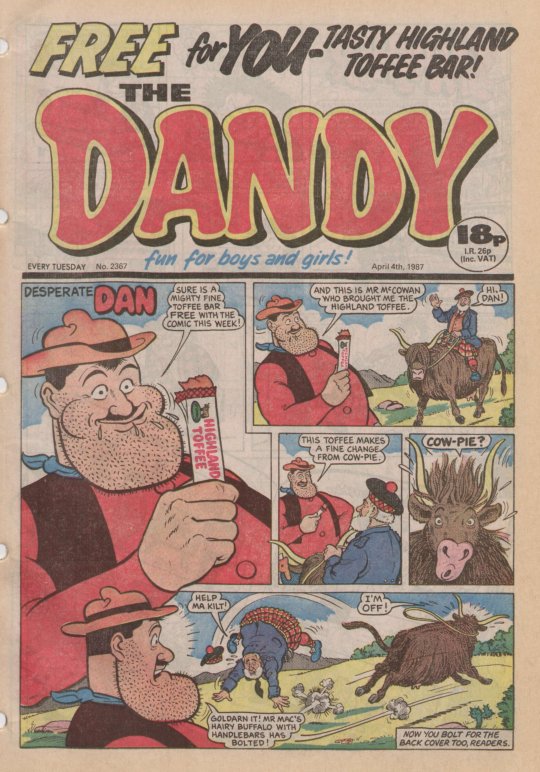
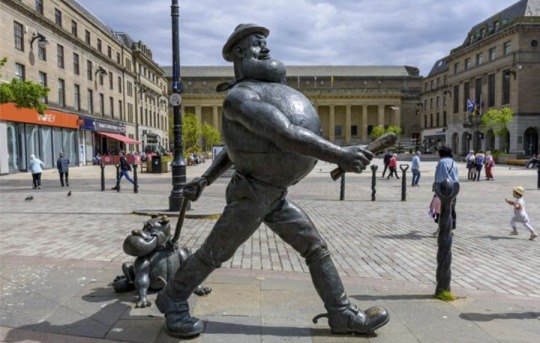
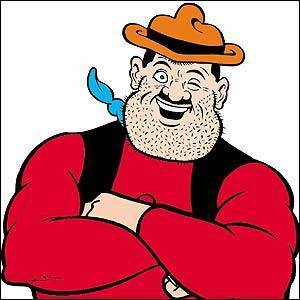
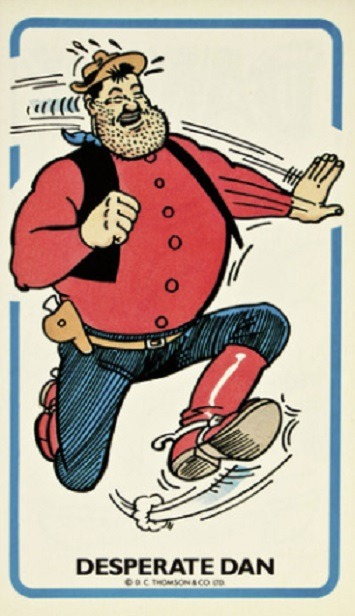
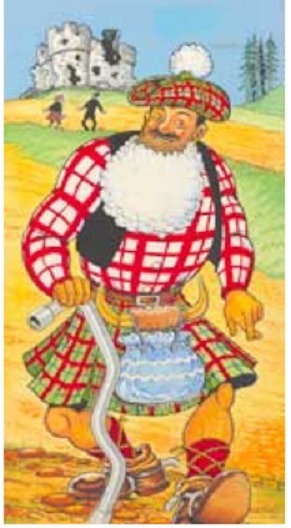
On December 4th 1937 cartoon character Desperate Dan first appeared in the Dandy comic. on it's launch day.
The face of Desperate Dan was sketched out as Dudley Watkins sat at his desk in Dundee, combining inspiration from the Wild West and English polismen.
The artist originally saw his cartoon character as an outlaw and gave him a stubbly lantern-jaw, the strength to lift a cow with one hand, and an appetite for cow pie, complete with horns. But as the anti-hero of the Dandy caught the imagination of thousands of young readers, Watkins evolved his persona into a champion of the underdog.
Dan made his appearance in the first issue of the Dandy on December 4th 1937. He survived until the comic closed in 2012, reappearing in a short-lived app.
He was just one of many comic book characters which Watkins created for Thomson’s Dundee publishing house. The success was huge, and Oor Wullie and The Broons, written in broad Scots, soon followed and became an essential part of school bairn’s lives.
A devout Christian, Watkins lived in a substantial house in a village near Dundee. It was his ambition to adapt the whole Bible into illustrated format, but that dream was never realised.
On the morning of August 20th, 1969, his wife found him at his desk, a half-finished Desperate Dan strip on his desk. He had died of a heart attack. His strips Oor Wullie, The Broons, Desperate Dan and Lord Snooty continue to be popular to this day.
In a 2006 BBC documentary marking 70 years of Oor Wullie, it was claimed that, due to his frequent mocking of Axis leaders in his comics before and during World War II, Watkins’ name was on a list of enemies of the Third Reich.
The final printed edition of The Dandy was issued on 4 December 2012, the comic’s 75th anniversary, after sales slumped to 8,000 a week. On the same day, The Dandy relaunched as an online comic, The Digital Dandy, appearing on the Dandy website and in the Dandy App. The digital relaunch was not successful and the comic ended just six months later.
17 notes
·
View notes
Text

Who knew that the Nazis persecuted the Polish Catholic Church because of antisemitism? Rudolf Rosner was one of approximately 3000 Polish Catholic priests who were murdered by the Germans during the Second World War. Obviously this had nothing to do with antisemitism and everything to do with Nazi Germany's stated goal of destroying the Polish nation.
Long before signing the Molotov-Ribbentrop pact and agreeing to carve up Poland with their Soviet allies, the Germans had already formulated a plan (Generalplan Ost) to turn all of Eastern Europe into the Lebensraum (living space) of Greater Germany. This plan explicitly required the complete destruction of Poland.
Prior to the outbreak of World War 2, thousands of Polish citizens of the Third Reich were arrested and killed. The Nazis also prepared a special list of 61000 of Poland's leading citizens who were to be eliminated following the German invasion (the so-called Intelligenzaktion). They had even drawn up detailed architectural plans to recreate Warsaw as a provincial German town (with a small Polish slave colony in the eastern Praga district).
To the Nazis, the Polish people were Untermenschen (subhumans) who occupied a land which was coveted by the "superior" German race.
In his Obersalzberg speech to Wehrmacht commanders on 22nd August 1939, Adolf Hitler explicitly stated that:
…."I have issued the command – and I'll have anybody who utters but one word of criticism executed by a firing squad – that our war aim does not consist in reaching certain lines, but in the physical destruction of the enemy. Accordingly, I have placed my death-head formation in readiness – for the present only in the east – with orders to send to death mercilessly and without compassion, men, women and children of Polish derivation and language. Only thus shall we gain the living space we need"….
After the invasion of Poland, Nazi propaganda minister Joseph Goebbels wrote the following in his diary on 10th October 1939:
…."Poland is finished. Recreation of the former state is not even discussed….the Führer feels absolute disdain for the Poles. More animals than humans, totally numb and amorphous"….
SS leader Heinrich Himmler said that:
…."All Poles will disappear from the world….It is essential that the great German people should consider it as its major task to destroy all Poles"….
Hitler's personal secretary Martin Bormann summarised the Nazi attitude to Polish and other Slavic people as follows:
…."The Slavs are to work for us. In so far as we don't need them, they may die. The fertility of the Slavs is undesirable. As to food, they are to not get more than necessary. We are the masters. We come first"….
Hans Frank, the General Governor of German-occupied Poland, also shamelessly declared that:
…."The Polish nation is not worthy of life and should be destroyed"….
Nazi Germany's genocidal intentions towards the Polish people were crystal clear, and although Western historiography on the subject of Poland in the Second World War is focused almost entirely on the holocaust, the Germans also committed some of the worst atrocities in all of human history against the Polish slavic population (mass murder, the destruction of hundreds of Polish villages, ethnic cleansing, deportation of millions of people to concentration and labour camps, the kidnapping of Polish children for forced Germanisation, the brutal suppression of the Warsaw Uprising etc).
They systematically persecuted the Polish Catholic Church as part of the Nazi campaign of cultural genocide in Poland. Thousands of churches and monasteries were closed, seized or destroyed, and eighty percent of Polish Catholic clergy were sent to German concentration camps, where at least 1800 lost their lives (more than 800 in Dachau alone).
The Auschwitz concentration camp was established on Heinrich Himmler's orders in April 1940 and was located in Polish territory that was incorporated directly into the Third Reich. Alongside Stutthof (opened in 1939) and Majdanek (opened in 1941), it was constructed initially to intern Polish slavic prisoners.
The Germans incarcerated approximately 450 priests, seminarians and monks in Auschwitz, as well as 35 nuns. Most of them perished there or in other German camps.
#auschwitz#auschwitz-birkenau#concentration camp#german concentration camp#history#second world war#world war 2#germany#poland#polska#bad history takes#bad history take
6 notes
·
View notes
Note
Are you currently reading anything?
Be prepared for an onslaught because I am not normal and I read several things at once and that’s not even counting fanfiction! These were all started within this year and I plan to finish them before next!
First section - Sizzle pretends she’s smart and knows things (non-fiction)
A village in the Third Reich by Julia Boyd - very readable and I highly recommend! Really deepened my understanding of the life of ordinary people during the Third Reich. On my need to finish list
How to Make an Apple Pie from Scratch by Harry Cliff - Wonderful and I learned a lot about particle physics from what I’ve read so far!
An Emotional Dictionary by Susie Dent - What is on the tin, words to describe common feelings that you might not have known existed. Less of a read and more of a resource but wonderful nonetheless.
For a recommendation of non-fiction that I would read again, Sapiens : a brief history of humankind and Homo Deus : a brief history of tomorrow by Yuval Noah Harari
Second section - Sizzle is a contemporary YA reader through and through (she swears she reads many genres not just YA romance, you caught her at a lacklustre month guys) (she wanted to slam her face into a wall reading Lord of the Flies - she gets its a satire, did not help the feeling) (fiction)
Red, White and Royal Blue by Casey McQuiston - rereading with the movie out. As remarkably witty and swoony as ever
One Last Stop by Casey McQuiston - rereading as well because it’s my favourite book by the author. Fun time all around
There’s a couple others but it think I’m dnf-ing them because I know my worth. Please throw me some good older thought-provoking fiction my way I need it >_<. I recommend Truly Devious by Maureen Johnson - gripping murder mystery novel in a writing style I adore (:
Final section - Sizzle faces the haunting sight of her ao3 marked for later list (fanfiction)
All the Missing Pieces by @uptoolateart - I will sing its praises from the rooftop. Amazing exploration of Adrien’s character and how canon things and the sort of au the fic is set in affects things in his future. Love me some adult Adrienette with kids expansion pack
Bon voyage by @keeperofthebox - Quickly ascending the ranks of my favourite fics with each chapter. I love seeing Adrien struggle I guess >_<
Of course I have plenty of other fics marked that I have yet to read or finish because a.time or b.they’re ongoing still.
Thank you for coming to my ted talk and wish me luck in finished all this by December.
20 notes
·
View notes
Text
My idea for a Resident Evil sequel
Someone call @just-shower-thoughts cuz this idea came to me during the steamy cleansing ritual.
So we all know that RE sequels & remakes are inevitable, due to how much of a cash cow that franchise is. Thus, I decided to jot down my own idea for a hypothetical RE9 or RE10 (or Resident Evil X, since this franchise is just campy enough to give it's 10th game that title a la Final Fantasy).
The plot is as follows:

Sheva Alomar and Rebecca Chambers are sent to a small town in Germany by the BSAA to track down rumors of BOW sightings.


Once they touch down, they're informed by their local contact that German citizens have been going missing, with the word on the street linking all the disappearances to a terrorist group known as Eisengeier.
With this knowledge, they set out to begin their investigation, but are suddenly attacked by a crazed local. Forced to defend themselves, they are left with no choice but to neutralize him. This causes them to be labeled as criminals, due to the lack of any obvious signs that he was a zombie, and they're forced to go on the run.
The first third of the game then becomes that of Cat-and-Mouse, with the two ladies trying to evade the law and gather intel to clear their names and resume their mission.
Eventually, they uncover a grand conspiracy, showing that Eisengeier has infiltrated the local government and has been kidnapping citizens with the help of law enforcement. They also learn that Eisengeier is being funded by an international arms dealer who calls himself Stroheim Stromberg. Armed with this knowledge, they set out to uproot the corrupt officials and obtain the location of Stroheim. This culminates in a boss battle wherein the Eisengeier official transforms into a monster by cannibalizing the politician he was working with, leading to his subsequent destruction. Before he dies, our duo are able to acquire the location of his boss: A castle tucked away in the forested mountains on the island of Usedom.
The second third of the game begins once they get to the island, where in they find that Eisengeier have completely taken over the Polish-owned side, and must fight their way through to get to the mountains. At the end of their first skirmish, they're confronted by an Eisengeier officer, who violently mutates before attacking them. This, along with the final boss battle from the previous third, confirms that much like the Ganados and Majini before them, both the members of Eisengeier and the civilians they've been kidnapping have been experimented on and turned into monsters. With this new intel, our two heroines set out to the mountains.
The path to the castle is long and hard, as they keep finding small villages that have been taken over by Eisengeier that they have to clear out. One village is even home to an expansive secret lab, which is where the meat of this part of the game takes place. In this lab, they learn more about Eisengeier, its mission statement (i.e. very obvious Neo-Nazi eugenics BS), and the secret behind this particular brand of zombie infestation: A variation of the T-Virus that's been mutated and amplified by the blood of their primary subject, who's revealed to be none other than Jake Muller.

This causes Sheva & Rebecca to adjust their mission statement to include rescuing Jake, if possible. The second third ends with a boss battle, wherein an Eisengeier scientist, predictably, injects himself with the virus and transforms into a monster, forcing the ladies to set the lab to self-destruct to ensure not only his death, but also the permanent end to the group's horrific experiments.
The final 3rd begins when the duo finally reaches the castle, and they're forced to confront all the horrors within. Hordes of kidnapped infected, kitted up Eisengeier troops, lieutenants that are very obviously Reiching it up before they go monster mode, the whole nine yards. This all culminates in their rescue of Jake, who informs them of the truth regarding Stroheim Stromberg: His real identity is that of an overweight, balding, wheelchair-bound American named Enos Randallson, who funded Eisengeier to play out his delusional fantasy of "evolving into an Aryan God, just like Jake's father".
Why yes, this is supposed to be poking fun at Proud Boys. Why do you ask?
With Jake now in their party, the trio mobilize to confront Enos. Rather than accepting his defeat like a man, he throws a prolonged, nasally hissy fit that ends with him injecting himself with the modified virus and transforming into the grotesque final boss. The battle ends with the three spouting off one-liners before blasting him in the face with three rocket launchers, and the game itself ends when they escape the castle with the last piece of evidence they need to have the rest of Eisengeier arrested by proper German authorities.
And there you have it. My idea for Resident Evil 9/Resident Evil X. Pretty basic, but I still think it would be a very campy romp. What do you think?
2 notes
·
View notes
Text
By Lev Golinkin
The Canadian Parliament gave a standing ovation on Friday to a 98-year-old immigrant from Ukraine who fought in a Third Reich military formation accused of war crimes. The elderly veteran, Yaroslav Hunka was honored during a session in which President Volodomyr Zelenskyy of Ukraine addressed the lawmakers to thank them for their support since Russia invaded his country, saying Canada has always been on “the bright side of history.” The Speaker of the House of Commons, Anthony Rota — who had compared Zelenskyy to Winston Churchill — recognized a “veteran from the Second World War who fought for Ukrainian independence against the Russians and continues to support the troops today even at his age of 98.” The assembly then rose to applaud a man in a khaki uniform standing on the balcony, who saluted, according to this screenshot from Canadian television.

The man was identified as Hunka by the Associated Press, which published a photograph showing Zelenskyy smiling and raising a fist during the ovation.
The AP caption described Hunka as having “fought with the First Ukrainian Division in World War II before later immigrating to Canada.” The First Ukrainian Division is another name for the 14th Waffen Grenadier Division of the SS, the military wing of the Nazi Party; the unit was also called SS Galichina. This is the same unit that is honored by controversial monuments in Canada, Australia, and, as the Forward recently exposed, the suburbs of Philadelphia and Detroit. Jewish groups have called for their removal. After a Forward article in August that was followed by coverage in the Philadelphia Inquirer, local television stations and other news outlets, the Ukrainian Catholic Archeparchy of Philadelphia temporarily covered the monument located in a cemetery in Elkins Park, Pennsylvania, pending discussions with local Jewish leaders. The Jewish Federation of Greater Philadelphia and regional branches of the American Jewish Committee and the Anti-Defamation League had expressed outrage about the monument. Formed in 1943, SS Galichina was composed of recruits from the Galicia region in western Ukraine. The unit was armed and trained by the Nazis and commanded by German officers. In 1944, the division was visited by SS head Heinrich Himmler, who spoke of the soldiers’ willingness to slaughter Poles.” Three months earlier, SS Galichina subunits perpetrated what is known as the Huta Pieniacka massacre, burning 500 to 1,000 Polish villagers alive.
There is more to the article. Read it. We should be hearing more about this over the next few days.
And according to this article, Canada also imported 2,000 of Hunka's SS Nazi friends at the end of WWII to live out the rest of their lives in comfort, untroubled by the atrocities they committed.
13 notes
·
View notes
Text
A bouquet of roses
Precedent chapter : 5
Chapter 6: Paris City of Light
22 December 1945, Paris
1
The hoped-for end of the war was approaching, already a large part of the North had been liberated by the landing while the South had been liberated by the resistance and the army of Free France, a landing had also taken place in Italy. Leading to his release and the hanging of Mussolini with his mistress by the Italian resistance.
However, despite these joys, the war continued, despite the death of several great figures of the Third Reich, his troops of vile soldiers continued the fight. In a few months everything will be over, at least that's what the American hoped. He was forced into a war that he didn't want. It had cost him a lot in men, especially in cannon fodder.
When he started this war, he never imagined himself being a nanny for his enemy's daughter. And here he is, guarding the girl while the United Kingdom went to buy food at a bakery. To support local businesses that had suffered during the war. It made America laugh, who knew that these traders were more traitors than anything else, they gave themselves to the enemy, selling them their bread and denouncing their neighbor who competed with them. Accusing them of being Jewish or resistant. They were like the rats that populated the garbage cans of Paris, a real vermin. Which could not be eliminated, so many were on every street corner, all the people of Paris who had given themselves without great resistance to the enemies. Cowards that America hated. Who changed sides like shirts according to the advance of the war, and he could without hesitation put his hand to cut that if the Nazis returned in force, those same people who cheered them would be those who would throw them into the arms of these dogs.
All this hatred that America had, reflected only his own cowardice that he had repressed under good «resolutions», a lie to himself.
At the park, where the American was waiting with the child, a comedian set up his carriage, setting up his little wooden stage. Some families watched with curiosity what the actor was doing, dressed in a red frock coat and white pants.
He declared that the show was open, and that all parents and children could attend it for free.
Attracting the curiosity of the American and the little girl, they both approached and sat down on the little benches that the actor had set up. They were joined by other curious parents. People were chatting about the coming of this traveling show, but also rumors about this actor that traveled all over France to tell his stories with puppets, and sometimes he chose people in the crowd to participate in his game. The actor asked for silence, which somewhat displeased America who was listening to the gossip.
"Ladies and gentlemen! Thank you for attending this modest puppet show. I will tell you three stories. The first one is about a little girl who is lost in the woods after running away from a big bad wolf. While the second will focus on a young girl who with her best friend will cross time and space in search of adventure. And finally, the third is a classic story of a knight slashing a dragon to save a princess but not everything went as planned! ARE YOU READY!"
Children shouting positively with joy.
The actor smiled and stood behind the big box. The red curtain rose, the play could begin.
"One evening like the others, a little mouse,Lily, was returning from her walk in the woods. She had picked beautiful fruits. Alas, she had taken the wrong path, after venturing deeper than usual, the woods that were previously so familiar and reassuring to her became darker, but above all more menacing, as she walked more. The poor little mouse had only her candle to light in these woods, she had to find her way back before it went out.
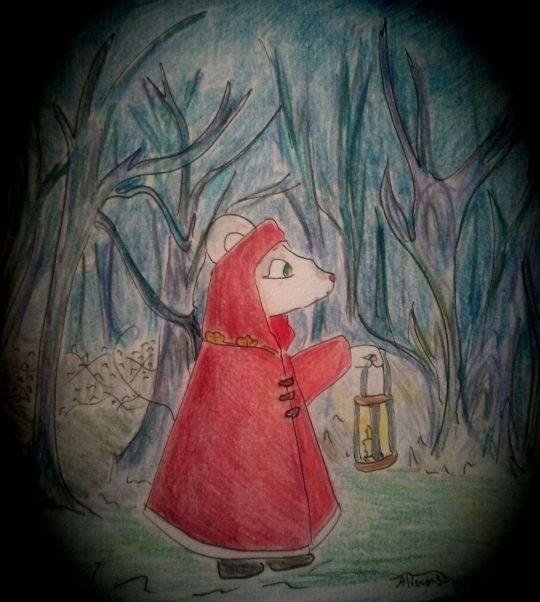
She turned left and then twice right and then left again. In the distance she saw a large tree, it was the cherry tree of the village chief. It was him who discovered it many years ago. She was closer to the road than she thought. Her small steps went faster and when she approached the cherry tree, her lantern lit up what seemed to her to be a bush in the darkness but which was actually the body of a child.
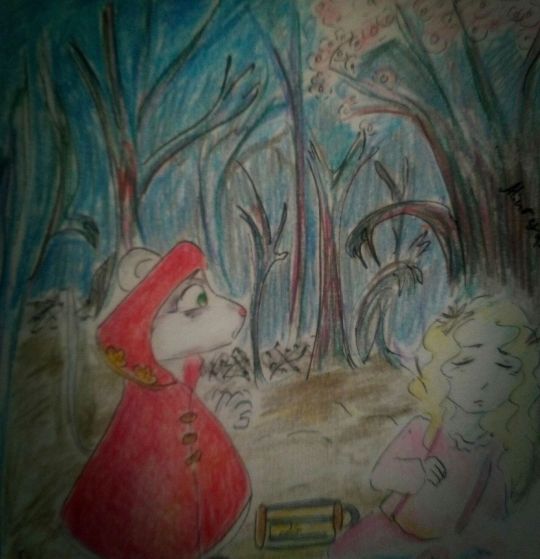
Frightened Lily dropped her lantern. The noise of the object did not wake the child. Distrustfully, Lily approached, stooped without leaving the child for a single second from her eyesight. Taking back her lantern, she played the light on the face of the stranger.
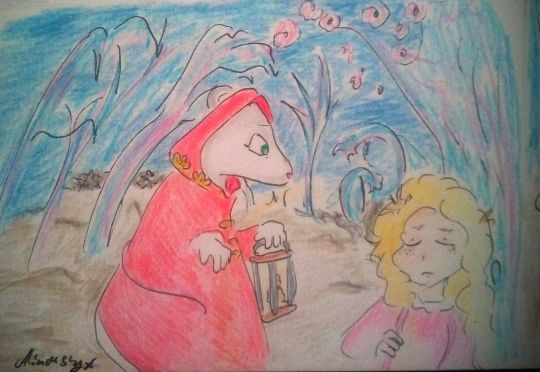
This burst of light manages to awaken the child, who uttered a scream of surprise. Just like Lily who was startle.
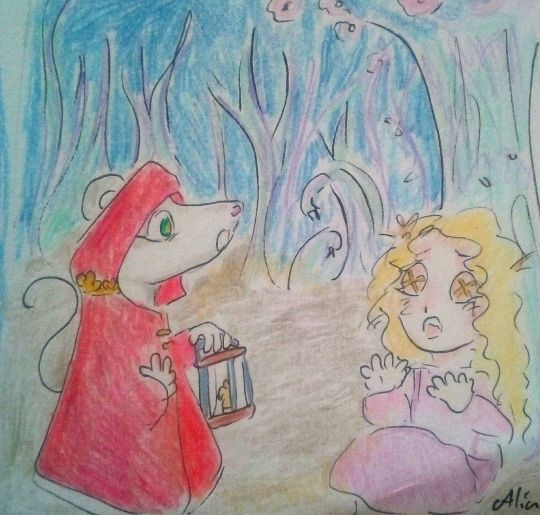
Lily tried to reassure the child, as best as she could. BUT! The child began to cry."I...""What's your name?" asked Lily gently."Cassandra.""Why are you in the woods, Cassandra?""A huge wolf devoured my whole family."When she heard the word «Wolf», Lily began to tremble. She knew very well who Cassandra was referring to. She nevertheless tried to hide her fear, not to worry the other little girl, who must have been slightly younger than her. Cassandra continued her unfortunate story. The wicked wolf had begun to devour her mother, piece after piece, starting with the clothes she wore. His hunger wasn't stopping, he devoured Cassandra's brother. The remaining child being wasn't plump enough or having enough shape, he decided to lock her in a small room where she would receive every day several meals and various accessories to keep herself clean and appetizing. Some evenings, he would come to check that she was growing well, sometimes asking her to undress and then after observing her. He judged that she was not yet tender enough to be devoured. But she would be, just in time for the great banquet. The night before the banquet, a black cat stood at the top of the window, and he proclaimed in a calm but authoritative voice:"Little child, if you want your salvation, pray all night and when the day comes, you will offer me your eyes and I will give you the key to go out."The child accepted his offer. And all night she prayed. When dawn lit up the tiny room, the desperate child turned to the cat. And as promised he took her eyes and replaced them with two golden buttons that will guide her to safety.He gave her the key to get out of her room. The child hesitantly walked into the Wolf's house. But the latter having drunk all the day before, did not realize anything. The house could tremble that he would not notice.Once she arrived at the exit, the child smiled. She was finally free.She ran in the woods for several hours, despite the hunger that held her belly and the fear of being caught. She stumbled several times against the roots, but immediately rose.Tired by all this walking. The child fell asleep against a tree. The birds promised her that they would watch over her while she slept. But as night fell, everyone flew to their nest. And so the two little girls met.
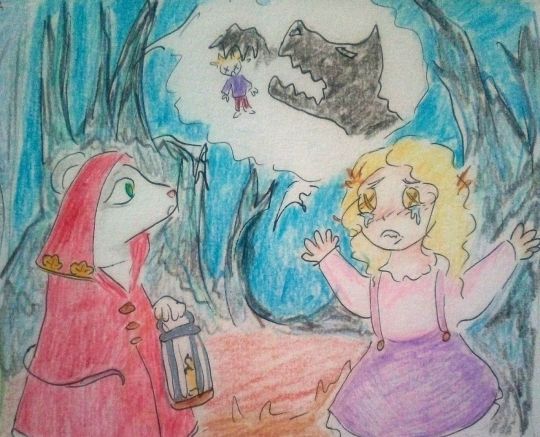
Moved Lily decided to help the poor child.
The two girls advanced into the forest, the moon's rays lit the trees with a soft light. The child felt that the forest became less worrying when she held the mouse hand.
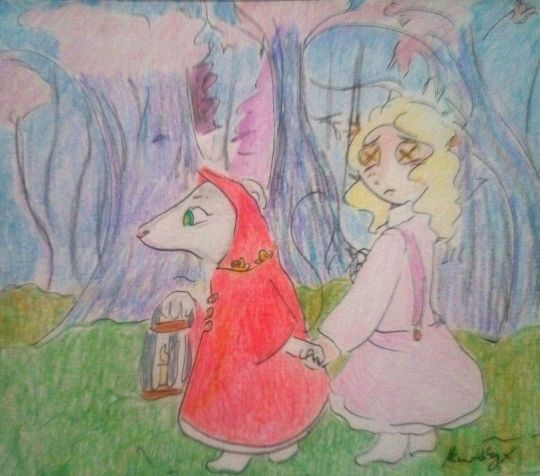
They arrived in Lily's modest home. It was time for the children to sleep."
The puppeteer closed the small blue curtain covered with stars and the round moon. And looked at his crowd, the children waited impatiently on their makeshift seat, their parents looked at the sky with an air of anxiety. Were they afraid of another air attack on this beautiful day? That amused the artist. The show would continue. He clicked on a small button that activated a mechanism and the curtain rose.
"Lily took the child to see the village wizard.
"Do you know how to defeat the Great Wolf?"
"No, I'm sorry. No one can beat him. Try asking The Great Fox, she's a hunter and she'll know better."
The two children thanked him and quickly went looking for her.
They found her next to the blacksmith's house, sitting on a tree trunk, sunbathing.
"Madam Fox, great hunter of the forest, do you know how to defeat the great wolf who devoured the family of this little human?"
" Yes, I know this creature. He's very strong and powerful. I can't beat him. His mastery of magic makes him overpowering. You must ask the wizard for help. I'm sorry."
"We've already been to him. And he told us to see you because you might know how to beat him."
"Alas, this is not the case and I can do nothing. If this is the revenge you'll seek, it will be difficult for you to achieve."
They questioned the other members of the village, but the answer was always the same. Nothing could defeat the great wolf, who was famous for his great knowledge of all sorts of magic and his brute force. Some said he was as high as the largest tree in the forest. Others that he could sneak into the slightest crack and that he could surprise you at any time. That his hunger was immense and never seemed to be full. And that those who had tried to overcome him had ended up devoured by him. His skin was so thick that the arrows and the tips of their swords didn't scratch him. His fangs were so sharp that he could cut through everything. Some whispered that he had already eaten a whole village that had upset him, including the houses. The grandmothers whispered to their grandchildren, that if they went out at night they might be taken and then eaten by the big bad wolf.
The two girls didn't know what to do anymore, they had spent the day looking for a solution, but all that came out was that the wolf was far too powerful for them. It was dinner time, but neither child was in the mood for it. They sat there, sitting in the fresh grass, thinking of a solution. The little human sang a little song that she had learned from her late mother.
She stopped when she saw the hunter come back from the forest, she held in a cage a little black cat, which seemed to sleep. The child immediately recognized it was the cat who had helped her out.
Cassandra ran towards the hunter. And asked her:
"Where did you find this cat?"
"In the woods. He walked with a long golden thread."
It was at that time that America totally fell away. He listened with one ear to the adventure of these two puppets. He had to remain on his guard, an enemy could always arise. He was watching the little girl, who was watching the play carefully, her eyes shining like stars. He was pleased to see the child having fun and forgetting what was going on around her. This carelessness peculiar to children, he could sometimes regret. America remembered those innocent moments when he fought battles with sticks against the others boys, who had the same age as him, in the suburbs of New York. Unaware of what the real war was and the suffering it brought like a funeral mantle. He hated more than the whole war, so many lives lost to self-centred leaders. Yet he knew that if he wanted peace, he had to do it. He had pushed it so far until he was forced to act. It was in his best interests after all.
The American tried to focus his attention again on the puppet show, without much success. The plot had gone too far. The two little girls were in the wolf's house. They were walking with felted steps. The little girl with blond hair poured a liquid into a glass. Poison, probably, thought the American.
The smell of a fruity fragrance grazed his nostrils. A rather robust woman sat beside him. She was dressed all in black. Her face was partly hidden by her beret and the black lace veil which decorated it, falling delicately on her face.She placed her bag in the small space between their feet, looked at the spectacle for a few minutes and then left again.
The bag! Is it a bomb? America wondered, he took the small object gently. He heard nothing. All the sounds around him had disappeared. Slowly he popped the little button holding the bag. His heart stopped for a moment. Nothing. Papers? A picture? But it's France. What's she doing there? Is she asleep? Why is she lying down? What's going on around? It looks like the inside of a train. The landscape is blurry. What the hell happened?! I have to warn him. Shit! Why is he still not back! A fucking bakery in Paris is not the most difficult thing to find. What the hell is he doing! And this woman, she's already disappeared. It will be impossible to find a fat woman, dressed only in black in this damn city. Especially just before Christmas. Wait, don't tell me. That son of a bitch is stopping in front of a toy shop . And that he is currently comparing what might please this kid. Misery. We're in trouble here. The show should be over soon and we can go looking for him.
The show is finally over. America took the little girl by the hand and led her to the park gate.
"Did you enjoy the show?"
"Yes!" replied Esperenza, enthusiastically. "I wish Mother and West could have seen it. I am sure they would have loved it. Especially when Cassandra and Lily release everyone at the end. And the wolf is turned into a skunk. It was fun!" The little girl laughed but America could see the sadness in her little eyes. So young and so unhappy, life had been cruel with her, and America pitied her. With a gesture he did not recognize himself to make, he took her in his arms, lifting her without difficulty. The child burst into tears and America gently stroked her back. He did not know what to say, what comforting words could soothe her grief. He remembered his mother's words, and tried to formulate them. It seemed to work, the little girl cried a little less.
"I am hungry." Murmured the little girl with a voice broken by tears.
"We're getting something at a bakery. What do you want to eat?" Surprisingly ask America in a sweet tone.
" Pain au Chocolate and Croissant."
"Good. I'll have some bread for tonight, too."
"With or without seed?"
"We'll see what they have. Otherwise, we'll have brioche."
"Ah ahaha !" The child began to laugh. "We don't eat brioche with something salty!" She protested.
"You don't know that. I know some very good recipes."
"It must not be good."
"Yes, I will. I will give you a taste."
"No!" Esperanza drew her tongue at him.
The rest of the day passed calmly and America manages to amuse the child. The United Kingdom finally joined them at dinner in their hotel room. America had bought sandwiches and had tried to take some pig's pie from a can and put it on a slice of brioche, then he tried to give it to Esperanza. The child preferred to take refuge at the top of the table rather than eat it. They had been running around the room like crazy laughing at each other. And it was at this scene that the United Kingdom came back into the room. With a stunned look, he sat down on the chair. Before bursting into laughter.
2
22 December
The day was nice, I saw a very funny show. It reminded me a little of my life. One of the puppets had blond hair like mine. I hope that like her, in the end I will find my family. I miss Mom and West. I made you a little sketch of the characters
She's Lily, she's a very smart mouse, she's the one who saves Cassandra
Cassandra is the puppet that resembles me, she is a bit like me, she is a little shy, frightened by the future and she also lost her brother and her mother. At least her daddy didn't become the wolf that ate them.
The puppet... puppeteer (I asked Mr United Kingdom what we call the one who does this kind of show, it is not easy to write), he gave me a small drawing representing Cassandra and me. He found it amusing that we looked alike. He did it super fast. Even America was surprised.
Now he just left on the balcony with Mr United Kingdom, they are discussing. I do not know what. I dare not come near them if they talk about me or HIM.
I ate a lot of good things today. Everything is fine. There were lots of shops on and lights everywhere, it was beautiful.
I cried
Ah! They're back. It's time for bed. See you tomorrow, my dear diary. We're getting close to Christmas, I wonder if Santa's coming to see me. I was a good kid, wasn't I?
#countryhumans#fanfic#A bouquet of roses#countryhumans east germany#countryhumans united kingdom#countryhumans america
2 notes
·
View notes
Text
There's been a lot of talk about the turmoil over the new judicial "reforms" that were just enacted in Israel, but what I haven't seen a lot of is an explanation how the Israeli far-right is enacting one of the most terrible lessons of the Holocaust.
Let me explain, SHORT RANT (TM) time.
INTRODUCTION
The Holocaust was one of the worst crimes of the 20th century, executed against the Jews among other races and peoples (including, but not limited to, the Romani, the handicapped, and LGBT people). One thing that can be learned, though, is how various forms of governance affected the outcomes.
WHERE WAS THE FINAL SOLUTION MOST EFFECTIVE?
The Final Solution, the extermination of Jews, among others, was carried out by the Third Reich, the Nazi Regime of Germany, which ruled between 1933 and 1945. One might expect, therefore, that Germany itself would see the highest percentage of Jews killed, but one would be wrong.
In fact, Germany saw 70% of its early 1940s population of Jews killed. This is a high number, but it's significantly lower than the 90% of Poland's pre-war Jewish population or the approximately 90% of the pre-war Balkan Jewish population who were killed.
Meanwhile, if you look west, you see much lower numbers. Only a 22% of France's pre-war Jewish population, 27% of Belgium's, 24% of Luxembourg's, and 1%-2% of Denmark's were killed by 1945. [1]
WHAT EXPLAINS THIS?
If you look carefully, one pattern becomes clear. Regions which were governed as Reichskommissariat [2], effectively under military rule, have much higher death rates among their Jewish population while areas which were effectively managed under nominal civilian governance, often as puppet states, have lower death rates.
This has a strong relationship to the rule of law. The law under Nazi rule may have been perverse, but the processes and procedures required in order to enforce that law provided important protections for the people who lived under it.
In the Reichkommissariat regions, there was no law or procedure to stand in the way of the Final Solution. Rather than having to work through the judicial process to corral and then export Jews to concentration camps, SS soldiers were simply able to go house to house, village to village, and murder Jews as they came across them; a much more efficient method that made it more difficult for Jews to escape and sympathizers to help them.
SO, ISRAEL?
Yep, Israel, the country formed in the wake of the Holocaust with the cry of "never again!" Yet Israel has always been split between its identities as a liberal democracy, promising freedom and equality for all, and its status as a state explicitly for the Jewish people. It has also grappled with, and continues to grapple with one particular problem in its founding; that there were already people on the land that they wanted.
Today, all of those struggles also exist with a continuing drive among Israelis of the far-right to colonize and conquer the occupied territory of the West Bank and expel or otherwise drive off the existing population of Palestinians.
THE ULTIMATE JEWISH SPLIT
Many of you probably already know that I am Jewish, by birth though not religion. As such, and because I'm also German, I was raised with an intimate awareness of the Holocaust and, in Jewish spaces, this event is still much discussed. Once you engage in that discussion, however, it can quickly become clear that there is a huge split between two different groups of Jews; those that believe that the Holocaust was wrong because genocide is wrong, and those who believe that the Holocaust was wrong because it happened to the Jews.
I think it's fair to say that those differing views of morality would drastically change how you approach the history of the Holocaust. Someone who believes that genocide is definitively wrong in all cases would only study the Nazis in order to prevent a repeat of the Holocaust while someone who believes that it was only wrong because it happened to them might be willing to study their tactics in order to use them on others.
THE RULE OF LAW
What we're seeing in Israel is a wholesale effort by the far-right religious and settler movements to dismantle the rule of law [3]. Netanyahu, the Prime Minister, is going along with this because he believes it will allow him to avoid accountability for the numerous crimes he's been accused of, but the far-right political parties he's allied with have been very clear that they believe that the rule of law is preventing them from carrying out what any reasonable person would agree are atrocities.
They've learned from the Holocaust in the worst possible way, and every Jew should be horrified.
[1], [2], [3]
2 notes
·
View notes
Text
The Evacuation of Auschwitz and the Death March
From January 1945, in the final months of the Third Reich, approximately 250,000 concentration camp inmates perished during death marches and in numerous acts of mass slaughter. These prisoners were mercilessly murdered by SS guards, army and police units, and, in many cases, by civilian mobs as they passed through towns and villages in Germany,Austria and occupied territories . This final wave…

View On WordPress
1 note
·
View note
Text
Swastikas on the Rez
161.08.12. - 161 survived Si7mt (winter solstice) since the start of Nuxalk genocide in 1862, 8th moon, 12th day.
5390XXXXX1, a number I have had to memorize. What does this 10 digit number hold? Represent? Embody? It could be many things, for now I’ll tell you it’s the number I carry to say that I am an Indian, not human.
I met a German woman a while ago, her first time to turtle island, her first time in my hometown. Coming to a place like Nuxalk territory, she really wanted to experience the culture, see the sites + wildlife. We frequently went on rides, hikes, even attended an event/gathering, from our local language it translates to “building up a village”. It was held where a family has been building on their ancestral lands through ceremonial and ancestral rights. My friend had a cool opportunity to do her first cedar weaving. As we shared our philosophies, laughed at cultural differences, talked stories through the valley, I had noticed I never took her through our Indian Reserve. In all honesty it’s not much to see. There is beauty, and lots of great people, many that have so much to offer society that may have not gotten that opportunity in the face of oppression and overwhelming odds stacked against the people. When you go through, there’s garbage everywhere, tattered houses still lived in, derelict masses of cars + appliances + furniture beyond repair, and the hateful graffiti and vandalism to decorate the vibe. I didn’t feel pride driving through the Rez with her, especially after passing a bus stop that had a swastika scorched into it, probably with some handheld torch kids use to numb their thoughts with dabs or hot-knifing. I noticed it, I knew she did, we drove in silence for a bit. I eventually got into the conversation of how nice things haven’t lasted long, the bus stops were out in that summer and have already been graffitied- to paraphrase her reply “yes, I seen a swastika on one of them. I wonder why? We’re the ones that know the implications, we’ve been taught the shame of it all.” All I could force out was “.. yeah, I wonder too”.
As I carry this with me over a time, I think about the history I’ve heard growing up of the Nazi’s victims, reading the Diary of Anne Frank in the 8th grade, the various movies documentaries and depictions of World War 2 and the Holocaust I’ve seen up until now. It’s been awhile since I’ve met my German friend, and I have been trying to educate myself more on the subject. No doubt a majority of my peers and those I’ve crossed paths with heard of how bad it was during World War 2, the atrocities and inhumane actions. One documentary series I got to watch titled “Hitler’s circle of evil”, and with a quick internet search it says “The story of the rise and fall of the Third Reich told like the drama it really was: through the personal relationships of the movers and shakers of the Nazi Party.”. It followed Adolf Hitler and how all of the Nazi party came together post World War 1. Adolf Hitler, Joseph Goebbels (Propaganda master), and Heinrich Himmler (leader of the genocidal programs) are 3 people that stick out to me when it comes to the rise and promotion of antisemitism in that era. When Nazi’s were thinking of “The Final Solution” to the “Jew problem”, they were looking on how they should get rid of them all for good, “purifying the lands of them and keeping the Aryan people strong.” For inspiration for the “Final Solution” they had actually looked to the West on how the Indians in Canada and the United States have been treated, genocide en masse, Canadian Residential Schools and American Indian Boarding Schools, the tactics to kill and assimilate. It was Duncan Campbell Scott, the Canadian Deputy Superintendent General of Indian Affairs (that’s a fvcking mouthful, which he held title from 1913-1932) coined the term “The Final Solution” in regards to the “Indian Problem” to kill the Indians through residential school. It’s worth mentioning Sir John A. Macdonald, Canada’s first Prime Minister, was the one who implemented Resedential Schools and was a main contributor in forcing the removal of the Indians of their land to reserves. Forcing the Indians to reserves was a tactic to make way for industry and to starve the Indians, stripping them of everything they had, considered “wards of the state” because we were “savages” who were “incapable of taking care of themselves”. We couldn’t leave, while the land and resources were being depleted, we were dependant on the food supply in the small grasp of us. The Resedential schools they stripped the children of their native names and given numbers or names of royalty of the colonizing countries, not being able to talk their native language, beaten + raped or killed to conform to the western society. A lot of the stories I’ve heard are from family, chosen family I’ve met over the years, and stories from books and documentaries over the years. This Macdonald mother fucker is on our $10 bill for creator knows how long? Not only was he a disgusting human, us NDN’s are reminded every time we want to buy food of the guy who brought so much pain and suffering to our people? In 1883 he told the House of Commons “When the school is on the reserve the child lives with its parents, who are savages; he is surrounded by savages, and though he may learn to read and write his habits, and training and mode of thought are Indian. He is simply a savage who can read and write. It has been strongly pressed on myself, as the head of the Department, that Indian children should be withdrawn as much as possible from the parental influence, and the only way to do that would be to put them in central training industrial schools where they will acquire the habits and modes of thought of white men.”.
Back to the Nazi’s. When they created concentration camps, a lot of holocaust victims were subject to starvation, their properties stripped of them, given numbers instead of names, not allowed to speak Hebrew, couldn’t practice their culture, beaten and killed. Are you seeing a connection?
Post World War 2, I hear the Hebrew language was pretty scarce. I also hear they were able to make a come back, getting fluent speakers in homes + families to live with and speak with. That is amazing, a true inspiration to hope. How come we as a people haven’t been able to do the same for our entirety? Maybe because the last Residential school closed in 1996? Maybe because of the ongoing oppression we face daily? Is Hitler or swastika’s on the German currency I wonder? Us NDN’s have so many stories, and culture, ways in the language, that are a huge asset to society. One of the set of dances in my home is a correlation to the values we must keep to society as a whole, the raw fish eater- the destruction of resources, the dog eater- the destruction of responsibility, the person eater- the destruction of community, the corpse eater- the destruction of everything sacred, and the self eater, the destruction of self. All of these would be told and shown during ceremony, to express the need of what we must not become. You know how in movies nations, or the human race unite to face a common enemy? What a triumph. In this sense, I would like to think the common enemy is shown to be within one’s own accountability. We all unite ourselves to overcome ourselves, and then leave the world better than we came, for those not yet born. The teaching of the animals and creatures on the land being our ancestors is a great one I hold dear. If it’s a pet, the ones before knew the human experience is a trying one and we need companionship. If it’s a one we eat, the love of the ancestors is pushed forward, becoming sustenance for the people. If it becomes one who wanders and lives in the land, the ancestor is living its best, unburdened with human worries, just existing to exist. It’s hard to deal with intergenerational trauma, to kick ourselves up as a collective. One inch and one step at a time. The oral traditions and practices of the NDN’s is very strong. My nation can pinpoint the day smallpox was deliberately introduced and spread to the people. We can also recount the beginning of time for the land being inhabited by our ancestors coming down in cloaks from creator himself down the eyelashes of the sun. We have the collective knowledge to co exist with the land, to flourish as one. Creator knows we need it. Be patient with us. Help us, help you, help earth, help each other.
It is a big journey we are on, trying to reclaim ourselves. Many are doing it well, and there is hope. I know there is.
I can’t condone the behaviour of a swastika on a bus stop, for all children and parents, locals to see, I can only speculate the meaning. Maybe it was just an ill informed kid vandalizing a bus stop. Maybe it’s the ghosts of an NDN spirit that is trying to say “This society isn’t safe for us NDN’s. Take care of yourselves.” One day there won’t be swastikas on the Rez anymore.
5390XXXXX1
My name is Wapat. I am of the first beings descended from the eyelashes of the sun, coming from the Stuwicmc. We have messages from the beginning of time. I am not human. I am supernatural.
P.S.
Conversations with others after sharing: I wanted to add somewhere in there “Yet we aren’t recognized the same way within the world view. We are told “get over it, it was a long time ago”, “you Indians should be grateful for modern conveniences, better go back to living in tipi’s then”. We have a high pain tolerance. Physical and mental. There is a lot that don’t respond in anger, but a loving anger to try and educate. I once read about an NDN in an airport being asked by a white man if he was native, which he confirmed and the white man said “so I pay your living then hey?” Hinting at the untrue idea that natives don’t pay taxes= we aren’t contributing to society, and that a lot of tax dollars go to natives making us not having to worry about basic necessities. Then the NDN reminded him of economics. How industry, how people live, how capitalism has integrated within the world to extract and pillage the land. And whose land is the system doing that to? NDN land. This economy is built around the injustices, a grave undoing to “be grateful for”.”
One friend said it was good to frame it as “Nazi’s” and not just “Germans”, which I did off the bat, making sure to have the distinction and not lump an entire people together- if I have slipped anywhere please tell me.
I tried to use the term Indian when talking from a colonial perspective and NDN from an indigenous perspective.
It’s a debatable question, what is justice in this sense? What is reconciliation? After WW2, the allies kicked up the Nuremberg trials- to put at least some accountability on those who had done so much wrong. Almost 200 Axis were put on trial, 161 convicted with 37 put to death. Some saying they “weren’t aware” of the atrocities happening in the Holocaust. The NDN’s never had a trial, it being our own government with the help of the Catholic Church, the ones who said “you are wards of the state, incapable of taking care of yourselves”, fewer than 50 people have been convicted in crimes regarding residential school, if then it was just a slap on the wrist. Sure survivors have a right to build a case for “compensation”, reliving the broken bones, deaths, beatings, rapes and inhumane treatment endured- of which some are just told “you don’t have a big enough case for this compensation”, a big FvCK YOU and a spit in the face. A dear friend of mine, was told exactly that. We know who the people are, how does one forget their oppressors? Aside from Native Allies, there is no shame in the countrymen in so called Canada as there was post WW2 Europe. It’s a hard thing. I don’t know what exactly the “Agenda” is for us NDN’s, I mean in the general population we are told to “forget” which isn’t something the world should do. “Reconciliation by land acknowledgment” still doesn’t sit right. Also reconciliation is when two parties did wrong and are trying to come together, which another local leader always tells us “I don’t think we did anything wrong”. Are we after forgiveness? I can’t tell you because I don’t know. I do know we are after co-existence, I do know we want to heal, “land back” isn’t just physical, it’s spiritual + emotional + conscience awareness of one another + our Mother Earth of which we share. It’s a hard thing. But here we are ❤️

#indigenous#indigenous writer#first nations#poetry#decolonization#decolonize#poets on tumblr#writers on tumblr#writing#thoughts#fyp#2024#kkkanada#landback#teach peace#reconciliation#today on tumblr
0 notes
Text
The Sower of Black Field Virtual Book Tour
Inspired by the True Story of an American in Nazi Germany Historical Fiction Date Published: April 15, 2024 INSPIRED BY TRUE EVENTS Throughout the Third Reich, millions of Germans pledged allegiance to Adolf Hitler. In the Bavarian village of Schwarzenfeld, they followed an American citizen. As he struggles to rekindle the faith of a guilt-ridden Wehrmacht veteran, a morose widow, and her…

View On WordPress
0 notes
Photo

A Polish slavic victim of Auschwitz falsely portrayed by PBS Learning Media as a "little Jewish girl in Auschwitz concentration camp museum" SOURCE: https://twitter.com/AuschwitzMuseum/status/1206939252208144384 The picture is actually of Krystyna Trześniewska, a young Polish victim of Auschwitz. She was born on 8th December 1929 in Majdan Królewski and was deported to Auschwitz five days after her thirteenth birthday. She was prisoner number 27129 and perished in the camp just five months later, on 18th May 1943. The image that PBS Learning Media uploaded to their website is of a photo that was taken at the Auschwitz Memorial Museum, showing a red flower that was placed in front of one of Krystyna Trześniewska's Auschwitz registration photographs, which is on display at the museum (all new prisoners were forced to pose for three pictures after having their heads shaved and changing into their prison uniforms - which usually consisted of a profile shot, a facial portrait and a photo in which they wore a head covering). Her registration photos are also featured during the Auschwitz sequence in Ron Fricke's excellent film "Baraka". According to PBS, its Learning Media portal "helps you transform learning".... However, before attempting to do that on the subject of Auschwitz it might help if they actually learned a few basic facts about the camp themselves. For example, the fact that when KL Auschwitz was established in 1940, its initial purpose was the internment of Polish slavic prisoners, who made up the majority of the inmates until 1942. According to Franciszek Piper, former director of the Historical & Research Department at the Auschwitz Museum, between 140,000 and 150,000 Polish slavs were interned at Auschwitz-Birkenau between 1940 and 1945, and 70,000 to 75,000 died there as victims of executions, medical experiments, brutality, starvation and disease. It really is the height of ignorance to assume that anyone pictured in a stripy uniform during World War 2 must be Jewish.... Krystyna Trześniewska was deported to Auschwitz during "Aktion Zamosc", a campaign of ethnic cleansing by Nazi Germany in the Zamojszczyzna region of occupied Poland, which is another subject that PBS Learning Media probably don't know much about.... Before invading Poland at the start of the Second World war, the Germans had already formulated a plan (Generalplan Ost) to turn all of Eastern Europe into the "lebensraum" (living space) of Greater Germany. This plan explicitly required the complete destruction of the Polish nation. After taking control of the Polish territory assigned to them in the secret protocol of the Molotov-Ribbentrop pact, the Germans incorporated western Polish lands directly into the Third Reich, while the rest became an occupation zone known as the "General Government" which was intended for German colonisation that would initially reduce the Polish population to the level of serfs, before their eventual extermination. The ethnic cleansing of the Zamojszczyzna region around the city of Zamość was carried out as part of this greater plan (and indicates what the implementation of Generalplan Ost would have meant for the entire Polish population if the Germans had been able to do it). Mass expulsions took place between November 1942 and March 1943 on the direct orders of Heinrich Himmler, and resulted in the clearing of 300 Polish villages (Jews who lived in this region had already been rounded up and sent to Bełżec extermination camp during Operation Reinhard). Some of the Polish children from Zamojszczyzna were stolen from their parents after being selected for forced Germanisation. Others were sent to Kinder-KZ Litzmannstadt, a concentration camp for Polish slavic children that the Germans created within the Litzmannstadt ghetto. "I have seen with my own eyes how the Germans took children away from their mothers....The act of their forcible separation shook me terribly....The Germans beat them with whips until the blood flew in case of slightest opposition, mothers and children alike. One could hear moaning and crying throughout the entire camp on those occasions....I have also seen small children being killed by the Germans" – Leonard Szpuga, a farmer expelled from Topólcza. Approximately 116,000 people - including 30,000 children - were rounded up and sent to forced labour camps or to the concentration camps at Auschwitz and Majdanek. At Auschwitz, at least 200 Polish children from Zamojszczyzna were murdered with phenol injections to the chest. The Germans planned to replace the Polish population of Zamojszczyzna with at least 60,000 ethnic Germans before the end of 1943. However, the ethnic cleansing and subsequent German colonisation of Zamojszczyzna was fiercely resisted. As well as helping the local population to escape the round ups, several thousand forest fighters of the Polish resistance began engaging German forces in the region in December 1942 and attacking villages settled by German colonists, some of which were destroyed. After halting their operations early in 1943 the Germans counter-attacked in June, with major anti-partisan actions and terror directed against the civilian population (Aktion Wehrwolf), but were never able to subdue the resistance. The Germans only managed to settle 9,000 colonists in the first half of 1943 and an additional 4,000 by the end of the year. Every victim of Auschwitz has the right to be remembered for who they actually were. Their identities should be respected, especially as they may have relatives who are still grieving for them. When the Auschwitz Memorial Museum asked PBS to correct their description of Krystyna Trześniewska's photo they initially changed "little Jewish girl" to "Polish Catholic girl" (without identifying her by name) but then removed the image from their website. Sadly, her memory has also been abused by others - including the Twitter account @AntisemitismEye, who decided to use Krystyna Trześniewska as an unofficial poster child for the Israeli Defence Forces. PBS Learning Media were also guilty of uploading one of the Auschwitz registration photos of another Polish slavic girl who was murdered at Auschwitz - Czesława Kwoka - and claiming that she was a "Jewish boy". When asked to make a correction by the Auschwitz Memorial Museum, they reacted by removing the photo rather than describing it accurately. Apparently, after realising that these victims of the Nazis were Polish and not Jewish, they no longer mattered....
#krystyna trześniewska#krystyna trzesniewska#history#poland#pbs#pbs learning media#pbs teachers#second world war#world war 2#germany#auschwitz
3 notes
·
View notes